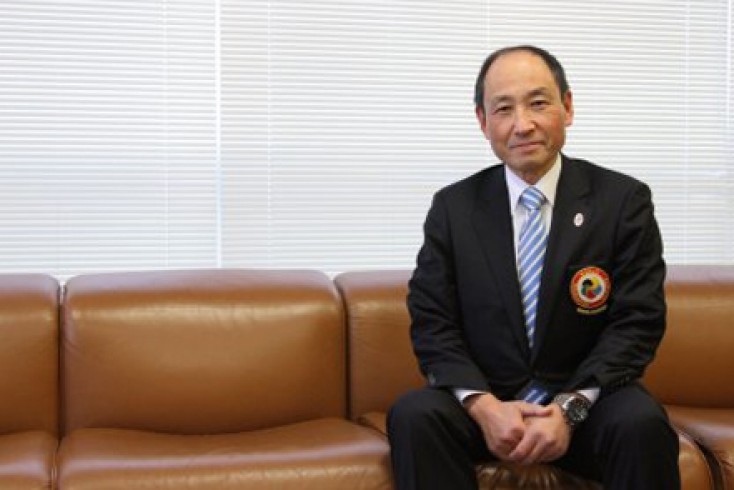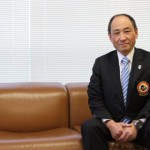My current goal as the WKF GS is karate’s participation in Tokyo 2020. “Make hay while sun shines”. – Next goal is to achieve the position of the IOC IF affiliate status. To do this, improvement of karate and our organization will be our tasks.
What is your relation to the sport of Karate?
“My encounter with karate” is one of the topics I’d love to talk about at this time. I and my 4 years older brother had a very close cousin. He was about 10 years older than us, and enthusiastic about training in karate at Hosei University Karate Club. He used to stop by my home after hard training and tell us some stories of karate while having tea together. Sometimes he showed us Tsuki or Keri, that left vivid impressions on us. So we had every reason to admire Budo (martial arts) and our cousin. Finally, my brother decided to join the karate club soon after his entrance to Keio Junior high school. Incidentally, Keio University Karate Club is the oldest. Established in 1924, younger students of their affiliate schools train together there even now.
In 1957, when I was 11 years old, the “All Japan Karatedo Championships for University Students” was held, for all Ryu-ha, in Tokyo for the first time ever in the world.Following my brother, I was able to watch the competition nearby. Keio University came in a close second by a score of 2-3 in the team kumite final against Meiji University. However, I still clearly remember almost all details of their matches from elimination to the final. Takushoku University which fought furiously with Keio in the 2nd round, had great prospective Senseis such as Keinosuke Enoeda, Tetsuhiko Asai, and Katsunori Tsuyama. Those blistering, and fantastic matches completely captured my heart. I also entered Keio Karate Club without hesitation after entrance to junior high school, same as my brother. I’ve never forgotten until today how I got excited when I was taught by the Karateka who performed superhuman feats before my eyes.
I ENCOUNTERED KARATE IN 1957.
WHEN I WAS 11 YEARS OLD, MY HEART WAS CAPTURED BY THE KARATE COMPETITION, WHICH WAS HELD FOR THE FIRST TIM IN THE WORLD.
That competition happened 35 year after Gichin Funakoshi introduced “Rentan Goshin Karate-Jutsu” from Okinawa to Tokyo. In that short period, Karateka in those days built the foundation of karate as a sport from “a mysterious martial art of self-defense”, overcoming the differences among Ryu-ha. This was my encounter with karate – both martial arts karate and sports karate.
NOW I AM WORKING AT THE FOREFRONT OF KARATE, EVERY DAY THE WORD “DESTINY” COMES UP TO MY MIND.
So, I am just wondering, how many people who competed or watched the world’s first sports karate championships are still alive?
Working at the forefront of karate as WKF General Secretary, whenever I remember my encounter with sports karate, the word “destiny” comes to my mind.
Given your knowledge about Karate,what are in your opinion the common factors of all karate practitioners worldwide?
Karate nowadays is an international sport spread among 189 countries. On that point, karate has attained an equal level to international sports such as football, tennis, swimming, track and field, fencing etc. except that karate isn’t an Olympic game.
I’ve lived in the U.S.A. and Hong Kong for 5 years each due to my job, when I was a young instructor. Over the last year, I traveled abroad on WKF business for 90 days, and exchanged opinions with numerous karateka. Of course I’ve discussed both perspectives of “Karate as Budo” and “Karate as a sport” with karateka in Japan.
So, let’s start from my conclusion. I never consider “Budo Karate” and “Sport Karate” as contrary or as concepts to compare. And I realize that karate practitioners all over the world are sharing common values whether definitely or indefinitely.
For example:
– The spirit of fair play. “Be a hard fighter and a good loser”. To fight fair and hard to the end following the prescribed rule. And nevertheless a winner should appreciate your opponents both winner and loser. A loser should praise a winner with grace after a match. Accept our defeat. Follow the referee. Winners become so by existence of losers, and a loser finds his weakness to overcome thanks to a winner.
– Karate begins and ends with Rei. [Rei : manner / bow]. Karate techniques originally contain intense destructive power. Therefore practice or competition start with Rei to instructors, ancestors, mates or opponents, also to Dojo and Tatami. We are reminded of modesty, respect, dignity, and the feeling of calmness through Rei.
– Karate is a lifelong elite sport. Karate is a sport for top athletes requiring hardened techniques, speed, reflexes, determination, and perfect self-control. On the other hand, karate is a lifelong way of fun for all generations, including retired athletes who train depending on their goals.
– However, the actual techniques of karate are NEVER used against opponents as evidence of power, except during competition or practice. Non-violence is the correct way.
– Karate is the interesting culture, where practitioners improve techniques they may never actually use in a lifetime. This way of training is called Budo.
– Karate gives us goods friends. Karate gives practitioners precious experiences at every level. “Practice makes the impossible, possible.” Through training, we learn how to control our own body and mind. This should be the essential quest for human beings. And we get opportunities to build firm friendships belonging to clubs, with team mates, organization members, opposing teams, or athletes from other countries. Now KARATE is the universal word which gives us lifelong friends.
– Additionally, the only word to describe those ideas should be “Physical Culture”. Karateka achieve developments of character and harmony with people. I guess this can be called one kind of culture formed by physical activities.
THERE ARE SOME COMMON VALUES THAT KARATEKA ALL OVER THE WORLD ARE SHARING. FOR EXAMPLE: THE SPIRIT OF FAIR PLAY, REI (MANNER/BOW), ASPECT AS AN ELITE SPORT, ETC.
Talking about the campaign for Karate in Tokyo 2020 led by the JKF in coordination with the WKF, what are the expectations in Japan and how is the campaign perceived there? What I would like to emphasize regarding this topic is that WKF and JKF are keeping the closest relationship ever in every sense. Our activities are proceeding on time.
As was reported already, the IOC has agreed with AGENDA 2020 which allowed Tokyo the right to propose inclusion of one or more events in the 2020 Olympics. WKF and JKF have developed various activities for Tokyo 2020 since late 2013. I received the special position and conditions as WKF GS living in Japan, including total support from JKF.
The promotion campaign began by organizing “team 2020 Tokyo” with JKF executives, media from outside of JKF, ad agencies, and WKF GS.
Secondly, the “2020 Tokyo All-Party Parliamentary Federation for the Promotion of Karate” was established with more than 160 participants of both houses of the Diet. The chairman of APPFPK Mr. Yoshihide Suga (the chief cabinet secretary of Japan’s government) submitted the petition directly to Prime Minister Shinzo Abe, with JKF president Mr. Takashi Sasagawa in attendance.
Third, the karate promotion group by Tokyo assemblymen was created. Their resolution for inclusion of Karate in Tokyo 2020 was submitted to Tokyo Governor Mr. Yoichi Masuzoe, TOCOG Pres. Mr. Yoshiro Mori, JOC Pres. Mr. Tsunekazu Takeda, and minister of MEXT Mr. Hakubun Shimomura.
Next, Mr. Sasagawa and myself continue appealing to Prime Minister Abe, the chief cabinet secretary Mr. Suga, the Tokyo Governor, TOCOG, JOC and other political or economic organization.
Also, our signature collecting campaign thus far has received almost 700,000 signatures by supporters from inside and outside of Japan. Here I’d like to thank all of them for their kind cooperation.
Finally, we are currently working with JOC and TOCOG. We expect that the event selection panel of 7 people will make their final decision within 2-3 months. If karate is proposed to the IOC as an additional event for Tokyo 2020, we will reach the next stage. Karate’s inclusion will then be decided at the IOC congress in the end of July or early August.
NOW JKF AND WKF CONTINUE PROMOTION ACTIVITIES FOR TOKYO 2020 IN THE CLOSEST RELATIONSHIP EVER. WE WILL RECEIVE THE RESULT VERY SOON.
WKF, JKF, and team 2020 Tokyo are working vigorously to create this great opportunity. Though nobody can make any predictions as to its success, we are firmly convinced karate is heading towards inclusion. The merits of this proposal include the spread of karate as a global sport, gender equality, anti-doping compliance, and the absence of unnecessary investments etc.
As the new WKF General Secretary,what are your expectations and your projects in the following 4 years?
Olympics and Paralympics
For now I am throwing all of my energy into promoting participation in Tokyo 2020. I will accomplish this as it’s said “Make hay while the sun shines.”
However, the final goal for WKF is not only Tokyo 2020, but to achieve and remain in the position of the IOC IF affiliate status. To do this, improvement of karateka, athletes, organization as an Olympic approved sport, spectator acquisition, and further promotion utilizing SNS tools will be our important tasks.
MY CURRENT GOAL AS THE WKF GS IS KARATE’S PARTICIPATION IN TOKYO 2020.
“MAKE HAY WHILE SUN SHINES”. NEXT GOAL IS TO ACHIEVE THE POSITION OF THE IOC IF AFFILIATE STATUS. TO DO THIS, IMPROVEMENT OF KARATE AND OUR ORGANIZATION WILL BE OUR TASKS.
The IOC’s view about Olympics has shifted. We have to consider that old views no longer pass nowadays. We must investigate sustainability as the IF managing Olympic/Paralympic Games.
To Strengthen the Organization
WKF re-acknowledged its firm unity in many aspects and strengthened our organization over the past year.
On the other hand, we are aware of the necessity to administrate with extreme caution. Because, karate as a global sport faces challenges such as cultural diversity, physical distance, and conflicting views of sportsmanship which are capable of creating confusion and weakening our unity.
While respecting each NF’s independence, WKF would also like to help them by offering information which is difficult to obtain for a single NF. Also introducing NF to one another to share their best practices, and etc.
From an international point of view, as WKF GS, what is the perception of Karate in Japan, and more specifically the vision of the youth in Japan towards Karate?
Most of the young generation consider karate as a combat sport. They do not identify karate with occidental sports such as ball games, fencing or wrestling. They have vague images of Budo for Karate. In this case, their image of Budo means a sport combines not only technical improvements but also the formation of character.
Certainly, the image of karate as a global sport for young people in Japan is WKF karate. Even though there are different rules depending on their team or school federations. Moreover, martial arts has become the required subject in all Japanese junior high school curriculum since April 2011. Karate is taught in many schools after Judo and Kendo. Needless to say, karate in the educational curriculum does not enforce breaking roof tiles or striking body as in traditional training. I can estimate that karate concepts are accepted by young people well enough. For example principles of instruction, maintaining mental balance through Rei, Kihon, Kata, and Yakusoku Kumite promote students’ awareness of self-control.
KARATE IS AMAZING. IT IS SOMETIMES CALLED “A GLOBAL SPORT” AND SOMETIMES CALLED “BUDO”. AND I GUESS THE ONLY WORD TO DESCRIBE ITS REAL MEANING AND VALUE IS “PHYSICAL CULTURE”.
As an afterthought
Also most karateka still emphasize some characteristics of Budo, like perfect spiritual harmony, techniques, physical strength, the building personality through training. They focus on developing a killing technique and lose interests in friendly competition.
They consider sports are played for fun with fixed rules. According to these ideas, karate would not be suitable as a global sport. They consider competition following fixed rules as the “degeneration of tradition”.
Meanwhile Sports Karate supporters explain karate has spread all over the world among whole generations, and has technically evolved because of being a competitive event – now reaching quite close to the Olympics.
In many cases both sides discuss and argue without conclusion about Budo and Sports. “Budo” Karate supporters believe with obsession that Budo is a higher concept and Sport a lesser concept, sometimes tacitly sometimes openly. They insist defining karate as sport destroys its tradition and dignity. I haven’t heard or read the clear definition dividing Budo and Sports. At least I am not to side with discussions deciding which is higher. (I would be less than for me honestly if I say I don’t feel corruption of traditional Budo when watching discourteous karate competitors. However, that is the problem of competitors themselves or referees/executives indifferent towards good manner. This matter is at all unrelated to the development of sport karate.)
Fairness following a rule – the major promise of sports, disinterested and cooperative spirit in team sports, precious experiences given by only training to make something impossible possible, true lifelong friends worked together ―— how can we define these sports values as “Physical Culture” subordinate to Budo, the way of building personality?
Budo and Sports.
Aren’t they both definitely worthwhile “Physical Culture.”




